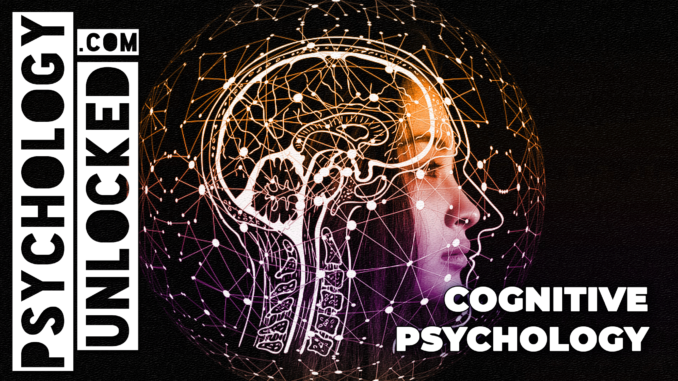
Cognitive Psychology is a division of experimental psychology that focuses on the mental processes by which knowledge of the world is attained, retained, and used.
The topics of cognitive psychology research are processes that are inferred from observations of human behaviour, but cannot be directly seen themselves. For example, attention, thinking and memory.
Cognitive psychology is, largely, a nomothetic approach; addressing the universality of human mental processes, rather than focusing on individual differences.
A lot of topics covered under the umbrella of cognitive psychology can be studied purely for their own interest – it’s intriguing to know how memory works just to understand how memory works…
But there are also many applications of cognitive psychology research. For example, there are many crossovers between cognitive psychology and social psychology – consider the mental processes involved with group identities and attitude change.
- The Dunning-Kruger Effect: Why we think we know more than we do
- The Yale Food Addiction Scale: Are you addicted to food?
- Addicted to Pepsi Max? Understand addiction in six minutes (video)
Stereotyping and cognitive dissonance are examples of psychological processes studied from both the cognitive and social approaches. The combination of these two approaches is often referred to as the study of social cognition.
There are also overlaps with developmental psychology, such as the work of Jean Piaget, considering cognitive development.
The origins of Cognitive Psychology
Since the mid-nineteenth century there has been an interest in human cognitive processes. However, it wasn’t until the 1950s that psychology became swept away by what has been termed the cognitive revolution.
This so-called revolution powered into force as American psychologists rejected the dominant behaviourist approach of the 1920s-40s and adopted a model of mind based on the computer.

Advances in technology and innovation pervaded the social sciences in a perfect example of a social zeitgeist influencing academic research.
Kessan and Bevan’s (1985) history of the cognitive revolution attributes the growth of the cognitive approach to Communications and Information Processing research in World War II.
Turing (1950) also notes the growing comparability of computer and human intelligence following huge technical developments in the Second World War, which also led to the development of digital computers.
And a third external influence on the development of cognitive psychology was the rise of generative grammar in linguistics by the likes of Noam Chomsky et al. whose academic mission was as much about destroying the concept of behaviourism as a serious scientific approach as it was about discussing the specific topic of language.
Original Areas of Interest to Cognitive Psychologists
Pattern Recognition
One of the first areas to benefit from the cognitive revolution was pattern recognition. This area of research studies how people perceive and recognise objects.
An example comes from Collins and Quillian (1969) who developed spider diagram maps to illustrate the networks of information held by an individual.
Sperling’s (1960) research on iconic memory also relies on an individual’s ability to perceive an object, and maintain that perception after the object had be removed.
Memory
Memory is one of the most commonly cited area of cognitive psychology and has been a part of the approach from very early on.
Atkinson and Shiffrin’s (1968) Multi Store Model of Memory proved to be very influential in the study of memory.
Subsequent research on Short Term Memory, Working Memory and Long Term Memory has highlighted a huge (and constantly growing) area of academic interest.
Recent Developments in Cognitive Psychology
Cognitive Neuroscience

Since the late 1980s there has been a growing interest in the neural bases of cognition.
Whereas cognitive psychology was initially preoccupied with challenging behaviourism, this new focus sees an increased interest in the biological element of mental processes.
Developments in brain scan technology have opened countless possibilities for research to continue addressing the biological elements of psychological processes.
Academic Articles about Cognitive Psychology
- Click here to read a journal article on the history of cognitive psychology, published in the International Encyclopedia of the Social & Behavioral Sciences, provides a detailed account of the development of the discipline with lots of references to key studies. (8 pages)
